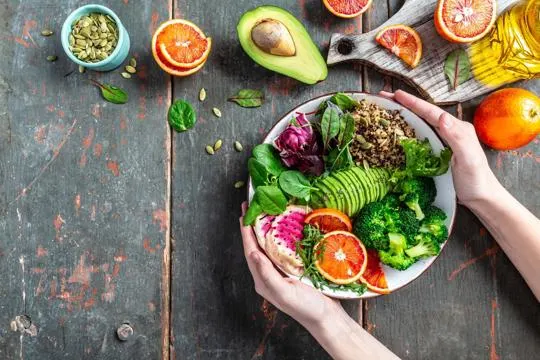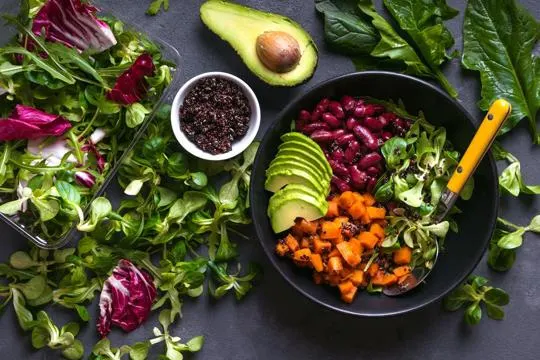Summary of key points
For some, being vegetarian is a lifestyle choice, while for others it’s a dietary preference. Vegetarians abstain from consuming meat and seafood, while omnivores include these food groups in their diet.
Both diets have their own set of benefits and drawbacks. A well-planned vegetarian diet can provide all the necessary nutrients and may lower the risk of certain diseases. On the other hand, an omnivorous diet can offer a wider range of nutrients and may be more sustainable for some individuals.
Ever pondered the gap between nibbling on greens and devouring a steak? We’re here to dish out the scoop.
Vegetarian or omnivore, it’s all about what fills your plate. Our diets define us more than we think.
I once tried going vegan. By day three, I dreamt of cheeseburgers. It was tough.
Vegetarians skip the meat, sticking to plants. Omnivores? They get the best of both worlds.
This isn’t just about food. It’s a lifestyle choice. Health, ethics, environment – it all plays a part.
We’ve all been at that dinner table, the odd one out. Now, we’re spilling the beans on this dietary divide.
Stay tuned. We’re carving into this juicy topic.
What is a Vegetarian Diet?

A vegetarian diet is one that omits meat and fish and instead focuses on plant-based foods such as fruits, vegetables, grains, legumes, nuts, and seeds.
It has become popular as it is associated with various health benefits.
Vegetarianism can be further divided into:
- Lacto-vegetarianism: Includes dairy and plant-based foods.
- Ovo-vegetarianism: Includes eggs and plant-based foods.
- Lacto-ovo vegetarianism: Includes dairy, eggs, and plant-based foods.
- Pescatarianism: Excludes meat but includes fish and seafood.
This type of diet offers many advantages such as being packed with essential nutrients like vitamins, fiber, minerals, and antioxidants.
It has also been linked to lower risks of certain chronic diseases.
Furthermore, it requires less land area for food production and produces fewer greenhouse gases related to livestock farming.
Some people may choose this lifestyle for ethical reasons.
It is evident that a vegetarian diet provides many benefits and is a personal choice influenced by individual values and preferences.
What is an Omnivore Diet?

An omnivore diet is one that consists of both animal and plant-based foods.
Folks on this type of diet can enjoy a variety of different food sources, like meat, fish, poultry, fruits, vegetables, grains, legumes, and dairy products.
Such a diet provides great flexibility when it comes to meal time, allowing individuals to put together meals to their personal liking.
It also allows for the intake of essential nutrients from both animal and plant sources.
Moreover, this diet offers lots of opportunities to customize meals according to individual preferences and needs.
This way, one can ensure they have a balanced and varied intake of nutrients, without excluding any major food groups.
All in all, the omnivore diet is a great option for those looking for dietary diversity.
Differences Between Vegetarian and Omnivore Diets

Vegans and omnivores have quite diverse diets. Vegans don’t eat meat.
On the other hand, omnivores eat both plants and animals.
Food Sources
Food sources divide vegetarians and omnivores. Whereas both eat food, their choices are different.
Vegetarians mainly rely on plant-based food like fruits, veggies, legumes, and grains for nutrition.
Omnivores, in contrast, have a more varied diet that includes not only plant-based food, but animal products like meat, seafood, eggs, and dairy.
This is where the distinction lies.
Veggies go for a plant-based approach, getting the majority of their nutrients from fruits and veggies.
Greens full of vitamins and minerals are vital for optimal health.
Legumes like lentils and beans are often included to get protein and essential amino acids usually derived from animal products.
Grains like quinoa and rice serve as staple carb sources.
Omnivores have a wider selection due to their inclusion of animal products.
They also consume fruits, veggies, legumes, and grains as part of a balanced meal plan.
Meat and seafood provide them with high-quality protein.
Dairy products like milk, cheese, and yogurt provide calcium.
It is clear that vegetarianism differs from an omnivorous lifestyle.
Both diets have nutritious elements for good health.
The distinction is in the selection of food sources.
Choice relies on personal preferences and beliefs about nutrition and ethical considerations.
Nutrient Composition
Nutrient composition separates vegetarian and omnivorous diets.
Both can fulfill nutrient needs, yet they differ in certain nutrients.
A vegetarian diet usually offers more fiber, magnesium, potassium, and vitamins C and E.
Conversely, omnivorous diets tend to contain more protein, vitamin B12, iron, zinc, and omega-3 fatty acids.
These variations in nutrition stress the importance of considering individual dietary needs when picking a vegetarian or omnivorous lifestyle.
Knowing these distinctions can help people make informed choices about their nutritional objectives.
Health Implications
Health effects of vegetarian or omnivorous diets are important. Food choices impact well-being and health.
Those who eat vegetarian have lower risks of heart disease, high blood pressure, obesity, and certain types of cancer.
On the other hand, eating omnivorous provides essential nutrients like iron, vitamin B12, and omega-3 fatty acids.
Careful meal planning is key to ensuring sufficient nutrients regardless of diet.
Environmental Impact
The environmental effects of vegetarian and omnivorous diets are vastly different.
Plant-based foods such as fruits, vegetables, grains, legumes, and nuts used in vegetarian diets require fewer resources to produce, and emit fewer greenhouse gases.
This leads to less land use, allowing for the preservation of ecosystems and wildlife habitats.
Meat and animal products consumption contributes to water pollution.
Hormones and antibiotics used in livestock farming can contaminate water sources.
Intensive animal farming produces manure that can seep into groundwater systems or nearby water bodies.
Vegetarian diets require less energy input than omnivorous diets.
Reducing meat consumption can help alleviate pressure on energy resources used for livestock farming.
Choosing a vegetarian diet can reduce our environmental impact.
It conserves resources, minimizes deforestation, reduces water pollution risks, and decreases energy consumption.
Similarities Between Vegetarian and Omnivore Diet

Vegetarian and omnivore diets have similarities.
Both diets require a range of foods to meet their nutritional needs, like fruits, veggies, grains, legumes, and dairy.
Protein is vital for both. For vegetarians, it’s from plant sources.
Omnivores get it from plants and animals.
Both diets can be balanced and nutritious with a variety of foods.
Iron, calcium, B12, and omega-3s are important nutrients for vegetarians.
People on both diets can choose organic and sustainably sourced products.
This shows you can make ethical decisions no matter your diet.
Both diets can offer health benefits when managed properly.
Plant-based diets can reduce the risk of chronic diseases.
Omnivores can get essential nutrients like iron and B12 plus muscle support from lean meats.
Considerations for Choosing Between Vegetarian and Omnivore Diets
Choosing a diet is personal and has many factors to think about, like health, environment, ethics, and taste.
- Vegetarian diets can provide all needed nutrients with care.
- Omnivore diets offer more foods.
- Both have pros and cons for nutrition.
- Vegetarian diets need less land and water, so they are more sustainable.
- Ethics of animal rights and welfare also play a role.
- Vegetarianism is motivated by reducing suffering and promoting compassion.
- Some argue ethical omnivorism is possible with humanely sourced meat.
Personal preference is also important.
Some may enjoy the variety of omnivore, others prefer the simplicity and health of vegetarianism.
Finding balance between nutrition and taste is key.
Conclusion
After exploring the key differences between vegetarian and omnivore eating habits, one can see that both styles of diet can have their pros and cons.
Ultimately it will be up to each individual to decide which style or combination of styles works best for them.
While some may chose to go fully vegetarian or omnivore, others may opt for a mix of the two, creating what’s known as a “flexitarian” diet.
Regardless of your choice, however, it’s important to make sure that you’re getting all the appropriate vitamins and minerals from whatever sources necessary in order to maintain good health.
Furthermore, balance and moderation when choosing among vegetarian and omnivore meals is the key to any successful dietary program.
With all this in mind, eating on a vegetarian or omnivore-based diet has never been easier.
By understanding what makes each type of eating style unique, along with becoming more aware of food quality and how certain foods could benefit you more than others –– you’re well on your way towards making delicious choices that will help fuel your entire life.

Leave a comment